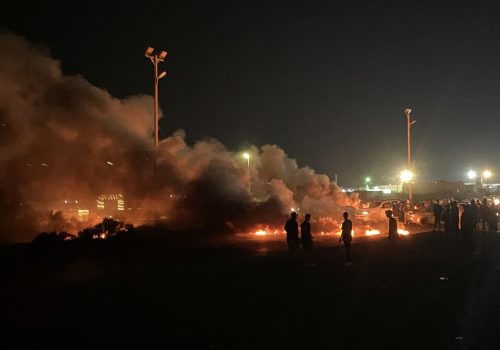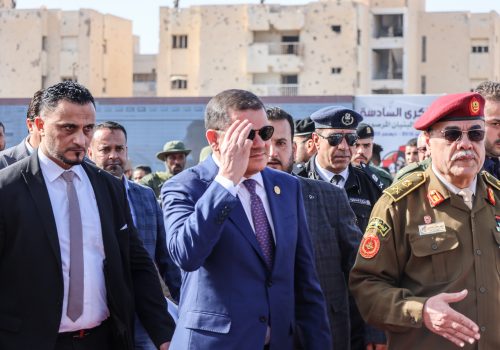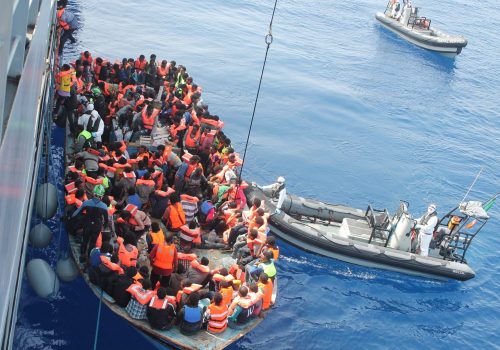The politics behind Morocco turning down help after the devastating earthquake
Horrifying footage continues to pour in from Morocco after the earthquake that shook the peaceful High Atlas Mountains in the region of Al Haouz on the outskirts of Marrakesh. Entire villages perched atop the kingdom’s highest peaks were leveled. Anguished parents turned over stones for a glimpse of life from under the rubble. Rows of dead bodies wrapped in blankets awaited burial. In the days since, the world has turned its eyes to the earthquake’s destruction—but also to Rabat’s management of the crisis and the politics behind it.
Shortly after the earthquake, Moroccan King Mohammed VI convened an emergency meeting and ordered his military forces to break the isolation of remote villages in dire need of food, shelter, and medical attention. Images showed Moroccan helicopters and military personnel defying the forces of nature and carrying out perilous rescue missions.
The international community swiftly reacted to the earthquake, too, conveying its sympathy and offering assistance. World leaders at the G20 summit, including host country India, expressed their full solidarity and readiness to deploy rescue missions on the ground. While Morocco allowed search teams from several countries to access the disaster areas and deploy their field operations, it declined or ignored aid offered by France and Algeria. This is likely due to ongoing political and diplomatic tensions with its former colonizer and its eastern neighbor. Images of Spanish, Qatari, Italian, and Senegalese search units and sniffer dogs, among other first responders, were circulated soon after the tragedy.
Politicizing humanitarian rescue
Since the news broke late on Friday, French commentators and media outlets rushed to accuse the Moroccan authorities of incompetency and blame them for “silently killing their people.” In turn, Moroccan social media users and intellectuals saw the French response as patronizing, a legacy of colonial arrogance and interference in the country’s sovereign decisions. As the hours passed and Morocco still did not respond to Paris’ offer to assist in managing the natural disaster, voices grew accusing Morocco of “refusing humanitarian interventions at the cost of its distressed population.” In an interview with French news station BFM TV, Moroccan journalist Samira Sitail reacted strongly against this view expressed by panelists, reproaching them for “inciting a revolt among Moroccan people and spreading false claims.”
Morocco did not give in to the pressure, and the Ministry of Interior released a statement thanking the international community and explaining the rationale behind its choice to only admit rescue teams from four countries. The ministry stated that opening its territories for all solicitations would be “counterproductive and chaotic” and that it “continues to evaluate the needs and respond accordingly in conformity with international standards.”
Meanwhile, the facts suggest otherwise and point to deeper frictions between the two countries. Local reports state that the Moroccan king refused to receive a condolence call from French President Emmanuel Macron. In offering aid, Macron perhaps expected a response similar to Lebanese crowds, which cheered him and French aid during his visit to Beirut in 2020 following the deadly explosion there. If so, then he seems to have forgotten that North Africa has long waved goodbye at Mother France’s (Mama Franssa) submissive “center versus periphery” love story.
The hard reality is that even humanitarian rescue remains grounds for political calculations and tensions. Whether in response to an emergency or more generally for development, aid should never be forced on a nation, and countries in the Global South should always feel in control over who is allowed to operate in their sovereign territories. This is an especially fraught issue given Morocco’s colonial past and a recent pan-African revival rejecting French interventionism and treatment of the continent like its backyard.
In not accepting French aid, Moroccan leaders appear to view their country as refusing to victimize itself after the earthquake or to position itself as pleading for external charity. In a recent interview, Sylvie Brunel, the former president of Action Against Hunger, explained this view. Morocco would rather brand itself as autonomous and capable of mobilizing resources to address its own hardships, she clarifies, which explains why it only allows international actors that it thinks understand and respect these terms.
Additionally, Morocco became known for its singular style in foreign relations and managing crises—known as the “Mohamed VI style” in Moroccan circles—which grew more confident over the years in distancing itself from France and forging stronger ties with new and recovered allies. The North African kingdom terminated the duties of its ambassador to France, Mohamed Benchaaboun, in February 2023 following a series of disputes between the two countries, including the Pegasus spyware scandal in 2020. In reality, the Élysée and the Makhzen fell out of love as the latter started demanding clearer positions on the Western Sahara issue, as Morocco has been empowered by a stronger rapprochement with the United States, Israel, and Spain—all of whom now recognize Morocco’s claims over the disputed territory. “The Sahara issue is the lens through which Morocco looks at the world,” stated King Mohammed VI in a speech in 2022, describing his country’s foreign policy guidelines. It’s no different during such a national calamity.
In an exceptional move, the Algerian government—Morocco’s fiercest regional opponent since severing diplomatic ties back in August 2021—offered to open its airspace to humanitarian aid and medical evacuations and to offer humanitarian assistance “if Morocco asks for it,” another offer that Rabat has decided to ignore. If Morocco were to accept Algeria’s help, reciprocating Rabat’s proposal to assist Algiers in fighting wildfires in 2021, then it could be a new opening in the stalled and convoluted relationship between the two neighbors. However, given the cumulative history of mutual provocations and incidents—including the September 1 shooting by the Algerian coastguard of tourists who were visiting Morocco after they had strayed into Algerian waters—it is unlikely that any momentarily regained solidarity after a natural disaster would lead to a more substantial reconciliation.
Moroccan heritage hangs in the balance
Morocco will need significant financial and logistical support to rebuild wrecked edifices in Marrakesh and in the High Atlas Mountains. Vital civilian infrastructure has taken a toll from the earthquake, including roads, schools, hospitals, and electric plants. The culturally rich and tourism-reliant emerging market will also need urgent interventions to rehabilitate and safeguard damaged heritage sites.
Preliminary assessments show that the Kutubiyya mosque in Marrakesh, a twelfth-century structure built by the Almohad caliph Abd al-Mu’min, cracked during the earthquake. So, too, did an old citadel and several historic buildings in Marrakesh. The Great Mosque of Tinmal, the cradle of the Almohad movement and the shrine of its leader Al Mahdi Ibn Tumart, is also damaged. Other significant heritage sites affected by the tragedy include Moulay Brahim’s seventeenth-century Sufi brotherhood shrine and the Agadir Oufella fortress in Agadir.
On September 9, United Nations Educational, Scientific, and Cultural Organization (UNESCO) Director-General Audrey Azoulay pledged to assist the local authorities in assessing the damage and reconstructing culturally and educationally significant sites. Substantial funding and post-crisis heritage rescue expertise from Morocco’s international friends and allies will be needed to address the colossal damage on the ground. The US Geological Survey has estimated that the country could lose 8 percent of its gross domestic product this year due to the earthquake exacerbating an ongoing economic contraction in the country.
While international aid is much needed to help Rabat alleviate the looming humanitarian and economic hardship, the kingdom is adamant about setting some ground rules with foreign partners and not accepting any aid that, as Morocco sees it, would come at the cost of its national dignity and sovereignty. In the past, Western countries have used development aid and disaster relief as incentives for political reforms and an array of interventions. Some may argue that disaster relief should be distinguished from development aid given the often unexpected and perilous circumstances in which the former is needed, but that is ultimately a decision that countries must make for themselves. It is clear that this paradigm is shifting, and the Global South is growing in confidence and developing its own local capacities and expertise in confronting humanitarian disasters. In the case of Morocco, it is using this crisis as a public relations opportunity to rebrand itself as a capable and autonomous nation. Today, in the Maghreb and across the African continent, the age of foreign interference through humanitarian missions seems to be over.
Sarah Zaaimi is the deputy director for communications at the Atlantic Council’s Rafik Hariri Center and Middle East programs.
Further reading
Wed, Aug 30, 2023
Israel, Libya, and Italy were just reminded that diplomacy requires more than diplomats
New Atlanticist By Karim Mezran
A recent meeting in Rome between the Libyan and Israeli foreign ministers has resulted in protests in Libya and political pressure on Prime Minister Abdulhamid Dbeibah.
Thu, Aug 3, 2023
Libya: Back to the future?
Report By
The current Libyan situation is complex, influenced by numerous factors, including the conditions of the 2011 revolution. The misconception of it being a whole people's revolution led to a focus on elections instead of national reconciliation, hindering the rebuilding of consensus and a new social contract.
Thu, Aug 3, 2023
Irregular migration from North Africa: Shifting local and regional dynamics
Report By
Irregular migration from North Africa to Europe, especially through the Central Mediterranean route connecting Libya and Tunisia to Italy, is increasing once more. Italy has witnessed a surge in irregular arrivals, with approximately 136,000 migrants disembarking between June 2022 and May 2023, almost comparable to the high arrival period of 2014-2017 when around 155,000 migrants landed each year.
Image: Mohamed Sebbagh, 66, stands in front of his destroyed house, in the aftermath of a deadly earthquake, in Amizmiz, Morocco, September 10, 2023. REUTERS/Nacho Doce


